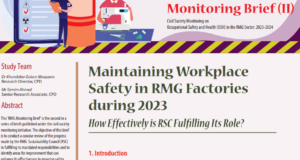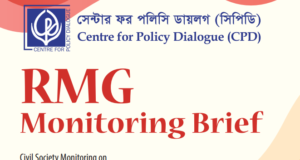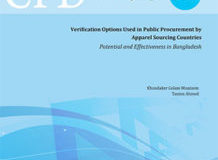Published in Dhaka Tribune on January 07, 2018
![]()
More jobs will push up the overall production capacity of Bangladesh resulting in higher growth. But the question is, are the industries engaging the youth and fresh graduates?
Attracting fresh investment from home and abroad is a priority for Bangladesh in order to create jobs and maintain the gross domestic product (GDP) growth, experts say.
According to investors and trade analysts, private sector investment has gone through a dull and stagnant situation causing slower job growth in 2017.
They came up with the suggestion of new investments (both private and public) to increase productivity and employment, which are badly needed to maintain the GDP growth.
According to Bangladesh Bureau of Statistics (BBS) data, in the last fiscal year, Bangladesh has registered a 7.28% GDP growth with a continuous upward trend. For the current fiscal, the government has set a target 7.4% GDP growth.
“As a businessman, my passion is to expand to create new employment. Due to some constraints, which include getting loans and utility services connection, it is not happening now,” a businessman, who has employed over 4,000 people, told the Dhaka Tribune on condition of anonymity.
On the other hand, there is fear of political instability ahead of the next election scheduled to be held in 2019. These issues put a pause on new investment from both home and aboard, he added.
According to Centre for Policy Dialogue (CPD), a local think tank, Bangladesh needs an additional investment of Tk6,000 crore in the private sector to reach a 7.4% GDP growth target.
“To retain the GDP growth, Bangladesh has to recover from going through sluggish trend by increasing private investments from home and abroad,” said Policy Research Institute (PRI) Executive Director Ahsan H Mansur.
Government investment should focus on infrastructural development as it is a prerequisite to paving ways for business development and if it is done properly, it will attract in more private sector investment, Ahsan said, adding that effective implementation of government investment also will expedite the private investment rate.
Sound and steady GDP growth will not bring benefits unless it drives away poverty from the country, the PRI executive director added.
Job creation key to success
More jobs will push up the overall production capacity of Bangladesh resulting in higher growth. But the question is, are the industries engaging the youth and fresh graduates?
Only 1.4 million jobs were created in the country between 2013 and 2016, whereas the figure was 4 million between 2010 and 2013, according to BBS data.
Between 2003 and 2010, total employment grew by 3.1% per year before falling back to 1.8% between 2011 and 2016.
“Focus should be on creating more opportunities for the youth and women to ensure access to the job market in tapping the demographic dividend,” former finance adviser to caretaker government and economist AB Mirza Azizul Islam told the Dhaka Tribune. “At the same time, the stakeholders should concentrate on workers’ skill to make them fit according to industry needs.”
Since there is probable downside risks of political instability ahead of elections planned for early 2019, the government has to think carefully in reaching the growth target, said the former finance adviser.
In order to ensure credit flow to the business sector, Bangladesh Bank should bring stability in banking sector, which is going through irregularities, he added.
The economist also suggested that regulatory reforms as well as policy for private sector investors should be revisited to attract the investment needed for the employment generation that will reduce poverty.
Besides, the RMG sector, the largest export earners, has seen lower job creation as it is going through a safety correction.
“Job creation in the apparel sector was not at expected level due to ongoing safety inspection, while the expansion was slowed by the safety investment,” Abdus Salam Murshedy, managing director of Envoy Textile told the Dhaka Tribune.
But it will pick up as the safety inspection is to end by June this year, he added.
Special Economic Zones to lure foreign investment
Amid difficulties, there is hope for Bangladesh to woo foreign investment as it is offering attractive packages in Special Economic Zones.
As a South Asian country, Bangladesh has enormous opportunity to attract foreign investment as FDI flowing to South Asia rose by 6% to $54 billion in 2016, which will continue in the coming years.
“There is hope to increase foreign and local investment this year as the government has pledged to improve business environment by ensuring services under one stop service to boost the investors’ confidence on Bangladesh,” PRI Executive Director Ahsan H Mansur said.
But the government should give priority to the sector as well as the investors and should complete the projects to reap the benefits, he added.
FDI from the Asian countries can be an advantage for Bangladesh as China is shifting business due to rise in workers’ wage, which is also helping attract investment from other countries like Japan, said the economist.
As the global economy is recovering slowly, we have to come up with new strategies to utilize the advantage to sustain the growth rate, he added.
As of last year, Bangladesh became the fourth largest FDI host among Least Developed Countries with $2.3 billion in inflows.
 CPD RMG Study Stitching a better future for Bangladesh
CPD RMG Study Stitching a better future for Bangladesh




